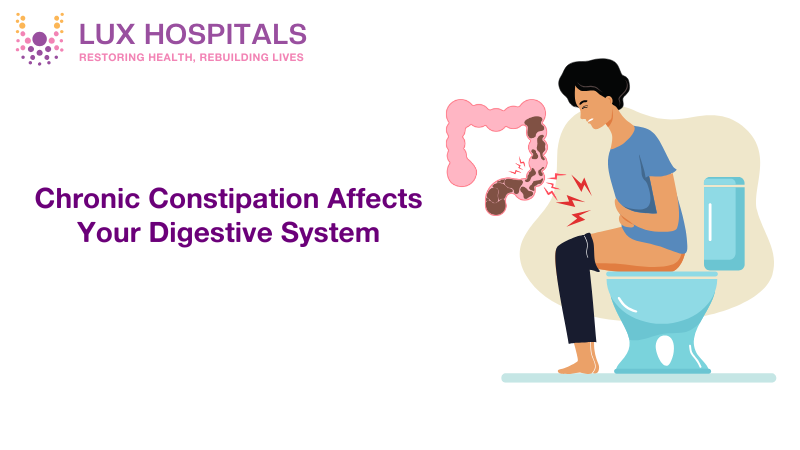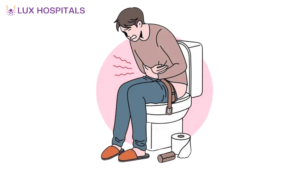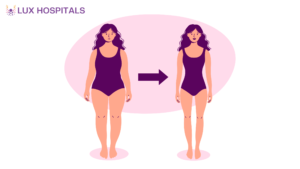Chronic Constipation Affects Your Digestive System

Chronic constipation is a frequent digestive disorder that affects millions of individuals across the globe. Irregular bowel movements, hard stools, and a sensation of incomplete evacuation define it. Chronic constipation is a chronic disorder that has a substantial influence on general health and well-being, as opposed to occasional constipation, which can be brought on by temporary dietary changes or stress.
Chronic Constipation and Its Impact on the Digestive System
The digestive system digests food, absorbs nutrients, and removes waste. When there is chronic constipation, it interferes with this natural process, which causes discomfort and other issues. Some of the most significant ways that chronic constipation impacts the digestive system are:
1. Slowed Bowel Movements
One of the major problems of chronic constipation is the delayed transit of stool into and through the intestines. This can result in too much water being absorbed in the colon, which makes stools harder and harder to pass. Eventually, this can cause more digestive discomfort and distress.
2. Bloating and Abdominal Pain
Chronic constipated patients have abdominal pain and bloating caused by the accumulation of stool in the colon. It will cause the surrounding organs to be pressed against, leading to pain and cramping. The long-term retention of wastes in the intestine can also result in gas formation, thus accelerating bloating.
3. More Risk of Hemorrhoids
Straining to have stools is a common symptom of chronic constipation. Overstraining can lead to dilated blood vessels in the rectal area, resulting in hemorrhoids. Hemorrhoids may be painful and be associated with bleeding and additional pain during passing stools.
4. Rectal Prolapse
In extreme cases, rectal prolapse is the protrusion of part of the rectum through the anus due to chronic straining and stress on muscles surrounding the rectum. Rectal prolapse must be treated medically, and in some instances, surgery is needed.
5. Defective Nutrient Absorption
The digestive system also absorbs nutrients, and chronic constipation can make it more difficult. The absorption of vital nutrients may be impeded by persistent waste retention in the intestines, resulting in deficiencies that impact overall health.
6. Intestinal Obstruction
Untreated and severe chronic constipation may result in fecal impaction, where hard stool gets stuck in the colon or rectum. This will result in partial or complete intestinal obstruction with severe pain, nausea, and vomiting. In extreme cases, surgery is necessary.
Causes of Chronic Constipation
Several factors may cause chronic constipation. Some of the most prevalent causes are:
1. Low-Fiber Diet
A diet with very little or no fibre can lead to chronic constipation. Fibre adds bulk to stool and makes bowel movement effortless. A diet with too much-processed food and fewer fruits, vegetables, and whole grains can delay digestion.
2. Inadequate Hydration
Fluid is required to soften stool and allow it to move through the intestines. When one does not have sufficient fluid, hard and dry stools are produced, which are hard to pass.
3. Sedentary Lifestyle
Physical activity propels bowel movement. Lack of exercise decelerates digestion and causes chronic constipation.
4. Disregard for the Urge to Defecate
Holding up bowel movements will enable stool to accumulate, firming it up so it becomes more difficult to pass. The body slowly loses its usual urge and develops constipation in the long term.
5. Medications
Some medications like painkillers, antidepressants, and antacids containing calcium or aluminum are a consequence of constipation.
6. Underlying Health Conditions
Irritable bowel syndrome (IBS), diabetes, thyroid disease, and neurologic disorders can cause long-term constipation.
Chronic Constipation Symptoms
Symptoms of chronic constipation will enable early intervention and treatment. The most common symptoms are:
- Less than three bowel movements a week
- Hard, dry, or lumpy stools
- Straining during bowel movement
- Feelings of incomplete evacuation
- Abdominal discomfort and bloating
- Feelings of rectal obstruction
If these symptoms persist for weeks or worsen, one needs to consult a doctor.
Treatment of Chronic Constipation
Chronic constipation is treated usually with the help of medicine, dietary modification, and habits. Certain effective techniques for managing chronic constipation are listed below:
1. Fiber Intake
Fruit, vegetable, whole grain, and legume foods are high in fiber and can cause bowel movements. Diet may not be sufficient; even supplements of fibre may be utilized.
2. Proper Intake of Fluids
Drinking water during the day causes normal bowelings and makes stools soft.
3. Exercise Daily
Constipation is preventable by exercise which stimulates the bowel, like yoga, walking, or running.
4. Formation of Habitual Bowel
The bowels can be trained by acquiring the habit of normal bowelings and withholding.
5. Over-the-Counter Laxatives
Taking mild laxatives from time to time will prevent constipation. Except for the doctor’s advice, do not take them on a daily basis.
6. Medical Treatments
Medical therapies, including enemas, stool softeners, or medication, can be taken when home treatments and dietary modifications are not adequate. Surgery is required in serious cases.
Conclusion
Chronic constipation is more than a bothersome nuisance; it can significantly affect the digestive tract and overall health. Knowledge of the causes, symptoms, and treatment of chronic constipation can empower individuals with the ability to take preventative actions to maintain digestive health. Food and lifestyle modification, proper hydration, and consulting a doctor when needed can help digest and feel good.
If chronic constipation is still present despite such alterations, referral to a health care professional for adequate evaluation and treatment is appropriate.
Frequently Asked Questions
Chronic constipation is a long-term condition characterized by infrequent, difficult, or painful bowel movements lasting for several weeks or longer. It can lead to discomfort, bloating, and other digestive issues.
Curing chronic constipation permanently requires a combination of lifestyle changes such as increasing fiber intake, staying hydrated, engaging in regular exercise, and maintaining a consistent bowel routine. In some cases, medical treatment may be necessary if underlying health conditions contribute to constipation.
Common causes include a low-fibre diet, dehydration, lack of physical activity, ignoring bowel movement urges, certain medications, and underlying health conditions.
Yes, untreated chronic constipation can lead to complications such as haemorrhoids, anal fissures, faecal impaction, and rectal prolapse.
You should seek medical advice if constipation persists for more than three weeks if there is blood in your stool, or if you experience severe pain, bloating, or unexplained weight loss.





















